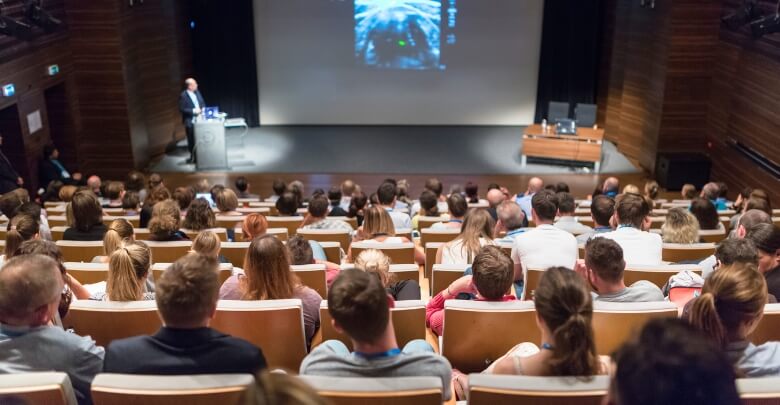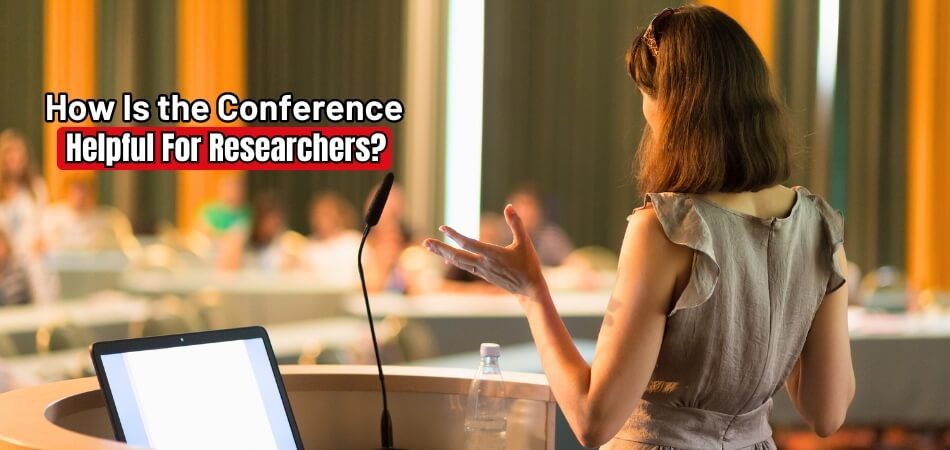Researchers often seek opportunities to expand their knowledge and network, and conferences provide an ideal platform for these activities. As a result, they tend to attend different types of events or conferences to grow their existing knowledge. So, how conference helpful for researchers?
Conferences provide researchers with valuable opportunities to present their work. They also enable them to receive feedback from peers and experts and stay updated on the latest advancements in their field. Research collaborations, funding opportunities, and visibility can result from networking at conferences.
Curious to learn more about the benefits of conferences for researchers? Continue reading to learn more about these benefits.
What is the Main Purpose of a Conference?
The core purpose of a conference is to create a gathering of like-minded individuals, professionals, or academics to discuss recent developments, share insights, and encourage collaborative efforts within a particular field or industry. Conferences serve as dynamic platforms where participants can exchange ideas, present research findings, and engage in networking that may lead to future collaborations or career opportunities.

By bringing together diverse perspectives, conferences promote innovation and problem-solving. They are pivotal in setting future research agendas and defining industry standards. Participants not only gain from the knowledge shared but also from the opportunity to build professional networks.
Moreover, keeping track of recent and upcoming international events like conferences in Canada, USA, or any other leading conference hosting countries allows attendees and organizations to stay connected with global trends, preparing them to address contemporary challenges effectively.
How Conference Helpful for Researchers?
Researchers benefit greatly from conferences, which are crucial events in the academic world. They offer a platform to present work, receive feedback, and learn about advancements. Here it explores how conferences are helpful for researchers in various ways.
Networking Opportunities
At conferences, researchers meet peers who share similar interests and challenges. This environment facilitates the exchange of ideas, encouraging collaborations that might not have formed otherwise. Networking also helps researchers find mentors and collaborators, which is crucial for advancing their projects.
Such interactions can significantly enhance their careers by providing insights and opportunities not typically found in academic settings. Researchers leave these events with new contacts and sometimes lifelong professional relationships, expanding their support networks within the field.
Access to Cutting-Edge Insights
Researchers benefit from conferences by staying updated with the latest trends and advancements in their field. Presentations and workshops provide a look at the latest developments of research before they even hit the journals. This immediate access is invaluable for staying ahead in constantly changing disciplines.
Conferences act as a catalyst for innovation and inspiration. They expose attendees to new methodologies and technologies that can enhance their research. This makes conferences essential for those looking to maintain a competitive edge in their work.
Feedback on Ongoing Research
Presenting at conferences gives researchers the chance to receive feedback on their current projects from diverse perspectives. This feedback can be crucial for refining their work and increasing its impact. Peer reviews and discussions often lead to improvements in the research design or methodology.
The interactive environment allows them to understand how their work fits into the broader context of their field, refining their future research directions. Moreover, feedback from knowledgeable peers helps identify potential problems before they escalate.
Professional Development
Conferences offer a plethora of workshops and seminars designed to enhance skills and knowledge. These sessions are designed to help researchers grow professionally, teaching them about new tools, software, or data analysis techniques. Attending these can lead to significant professional growth and development.
Moreover, the experience of organizing sessions or speaking publicly boosts confidence and hone communication skills. These soft skills are just as important as technical abilities in a researcher’s career progression.
Publication and Collaboration Opportunities
Attending conferences can lead to opportunities for publications and collaborations. These gatherings often attract editors and reviewers from various journals, opening doors to publish their work. Researchers can discuss their findings with potential collaborators, laying the groundwork for future joint projects.
In general, the benefits of conferences for researchers extend into tangible outcomes like co-authored papers and joint research initiatives. These collaborations can lead to larger-scale projects and more significant findings, benefiting the entire academic community.
Conferences serve as a vital platform for researchers to grow and succeed in their respective fields. The opportunities for networking, learning, and collaboration they provide are outstanding. For any researcher looking to advance their career and contribute meaningfully to their discipline, attending relevant conferences is an essential step.
How Can Attending the Conference Increase Your Research Skills?
A conference is a crucial step for researchers seeking to expand their knowledge and skills. Conferences offer a wealth of opportunities to learn and grow. This article explores how attending a conference can increase your research skills in various ways.
Learning from Experts
Conferences feature presentations by leading experts in the field. These sessions provide insights into the latest research trends and methodologies. Learning from experts helps researchers understand complex concepts better. This knowledge can be directly applied to their research work.
Participating in Workshops
Workshops at conferences offer hands-on learning experiences. They allow researchers to practice new techniques and methodologies. This practical experience is invaluable for developing research skills. Workshops often provide tools that researchers can use in their future projects.
Engaging in Seminars
Seminars provide a platform for in-depth discussions on specific topics. They encourage researchers to engage with the material actively. Participation in seminars improves critical thinking and problem-solving skills. This engagement helps researchers to refine their research questions and methods.
Networking and Collaboration
Networking at conferences can lead to valuable collaborations. Meeting other researchers opens doors to joint projects and shared resources. Collaboration brings diverse perspectives and skills to research endeavours. These partnerships can lead to innovative solutions and new research directions.
What Types of Resources Are Available to Researchers at The Conference?
Conferences are treasure troves of resources that support and enhance the work of researchers in numerous ways. These resources are tailored to meet the diverse needs of attendees, ranging from novice scholars to seasoned experts. Whether it’s gaining new insights, acquiring practical tools, or connecting with peers, the variety of resources available can significantly enrich a researcher’s experience.
Specialized Workshops
Workshops at conferences provide hands-on experience with new tools and methodologies. These sessions are led by experts who share their knowledge on specific topics, such as statistical software or experimental techniques. Researchers can learn practical skills that are immediately applicable to their work. Attending these workshops often results in an improved skill set that improves their research capabilities.
Expert Panels and Keynote Speeches
Keynote speeches and expert panels feature leading figures in the field who discuss current trends and future directions. These presentations are invaluable for researchers looking to gain insights from experienced professionals. An added advantage of attending conferences for residency programs is the ability to connect directly with experts who provide clarity on complex topics and foster a deeper understanding. Panels often include a Q&A segment, allowing attendees to engage directly with experts.
Research Publications and Materials
Conferences often provide access to a wealth of publications, including papers, articles, and books, which might not be widely available. These materials can include the latest research findings and comprehensive reviews that are essential for staying current in one’s field. Researchers can also discover open-source resources and tools that are beneficial for their work. Access to such a rich library of materials can propel their projects forward significantly.
Networking Opportunities
One of the most significant resources available at conferences is the opportunity to network. Networking events are designed to foster connections between researchers, industry professionals, and academicians. These interactions can lead to collaborations, mentorship, and even job opportunities. The contacts made during these events can be invaluable throughout a researcher’s career.
The variety of resources available at conferences can dramatically enhance the research and careers of attendees. From learning new skills in workshops to engaging with leaders in the field through panels, the benefits are manifold. Every researcher should consider these opportunities as stepping stones to greater achievements in their academic and professional journeys.
Essential Tips for Researchers to Find a Suitable Conference
You will have more opportunities for collaboration and learning when you become familiar with the world of academic conferences. Finding the right conference can open doors to sharing your work with peers and absorbing new ideas. Here’s how to pinpoint the event that best aligns with your research interests and professional goals:
- Define your research area and objectives clearly to filter conferences that match your academic focus. This makes it easier to choose events that truly benefit your career trajectory.
- Explore academic databases like Google Scholar and platforms such as ResearchGate for lists of upcoming conferences. These resources are tailored for researchers looking to find relevant gatherings.
- Membership in professional associations often comes with insider information on specialized conferences. These groups host events that can be pivotal in your field.
- Use social media and online communities to discover conferences and network with other academics. Platforms like Twitter and LinkedIn are hubs for conference updates and discussions.
- Check the websites of universities and research institutes as they frequently sponsor and host conferences. These institutions provide trustworthy details about many scholarly events.
- Search through dedicated conference directories and engines like Global Conference Alliance. These tools are designed to streamline the process of finding suitable conferences.
- Discuss with mentors and colleagues to gain insights from their experiences at different conferences. Their recommendations can guide you to high-quality events.
Including a conference in your academic journey not only provides a platform to showcase your work but also deepens your knowledge of the benefits of conferences for students, improving both learning and networking opportunities. Follow these tips to select a conference that aligns with your research goals and provides a productive environment for growth and collaboration. You can find new ideas, collaborations, and inspiration at the right conference.
How to Make the Most of Conference Experience?
Attending a conference can be an enriching experience if approached with the right mindset and strategies. Maximizing the benefits of an ideal conference for research presentations requires careful planning and active participation. Here are some tips to help you make the most of your conference experience.
Plan Ahead
Research the conference schedule and speakers beforehand. Identify sessions and workshops that align with your interests and goals. Preparing questions in advance can improve your learning experience. This preparation ensures you make the most of your time at the event.
Choose Sessions Wisely
Be strategic when choosing sessions to attend at a conference. Focus on topics that are most relevant to your work and interests. Diversify your choices to gain a broad perspective. Balancing your schedule will help you avoid burnout and stay engaged.
Network Actively
Networking is one of the most valuable aspects of attending conferences. Introduce yourself to peers and experts in your field. Engage in conversations and exchange contact information. Follow up with new connections after the conference to maintain relationships.
Participate in Discussions
Participating in discussions can significantly improve your conference experience. Don’t hesitate to ask questions during sessions. Your contributions can spark further discussions and provide deeper insights. Active participation helps you engage more fully with the content.
Take Notes
Taking notes is crucial for retaining information from the conference. Write down key points, insights, and ideas from each session. These notes will be valuable references for future research and projects. Reviewing your notes afterward helps reinforce your learning.
Frequently Asked Questions about How is the Conference Helpful for Researchers?
Conferences are an invaluable resource for researchers, offering numerous benefits that enhance their professional and academic growth. Here are some frequently asked questions about how conferences can be helpful for researchers, along with detailed answers.
What Opportunities Do Conferences Provide for Presenting Research?
Conferences allow researchers to present their work to a wider audience, increasing visibility and recognition. This exposure helps in building a professional reputation. It also opens up avenues for constructive feedback from peers.
Why Is Receiving Feedback at Conferences Important?
Receiving feedback from peers and experts helps researchers identify strengths and areas for improvement in their work. This constructive criticism can significantly improve research quality. It also encourages new perspectives and ideas.
How Do Conferences Help Researchers Stay Updated on Advancements?
Conferences feature presentations on the latest research and technological advancements. Attending these sessions keeps researchers informed about new trends and developments. Staying updated is crucial for remaining competitive in the field.
What Funding Opportunities Are Available at Conferences?
Conferences often feature representatives from funding agencies and organizations. Researchers can learn about potential funding sources and application processes. Networking with these representatives can lead to valuable funding opportunities.
How Do Conferences Help in Gaining Visibility?
Presenting at conferences and networking with attendees increases a researcher’s visibility within the academic community. Higher visibility can lead to more recognition and opportunities. It also enhances the researcher’s professional profile.
Last Words
The conference environment offers researchers many opportunities to advance their careers. It’s a great way to present work, receive feedback, and stay up-to-date on advancements. Networking, funding opportunities, and increased visibility in the academic community are all possible at these events.
Taking part in workshops, attending seminars, and learning from experts can increase research skills significantly. In addition to practicing and refining skills, conferences help researchers gain new insights. They offer a rich variety of resources, including research papers, case studies, and technological innovations.
The importance of conferences in the professional development of researchers cannot be overstated. By offering collaboration opportunities and resource access, they answer the question, “How is the Conference Helpful for Researchers?”. Planning, participating actively, and making strategic decisions can advance a researcher’s career.







